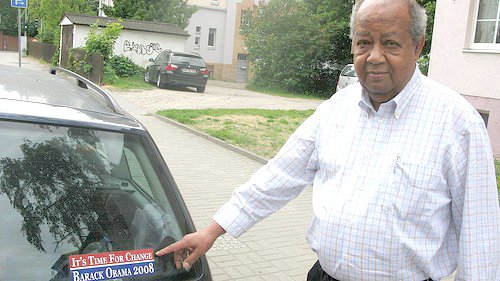“The prisoners had been systematically starved and were nothing but skin sunk in over the bones.
There was no underlining flesh at all. It was just horrid.”
By J. Leblanc
Gert Schramm was born on November 28, 1928 in Erfurt, Germany. He was the son of Jack Brackson, an Afro American engineer from San Francisco and his wife, Marianne Schramm, a German national. The couple meet while Jack was in Germany building a bridge for the American Steel Company. After his contract was finished, Brackson continued to visit his family.
However, with the rise of Nazi Germany in 1933, these visits to his family became increasingly difficult and outright dangerous. In Nazi Germany, his father’s marriage to his wife and their son were living evidence of an illegal interracial relationship that carried the death penalty for Jack and Gert under the Nazi purity laws.
On one visit in 1941, while trying to rescue his family, Jack was arrested. He was sent to the Auschwitz concentration camp and never heard from again. As he got older, Gert was denied and education and was classified as mixed race of the first degree. Under the law, this was race defilement, racial pollution or blood defilement.
In May 1944, the Gestapo arrested Gert who was 15 years old at the time. They denied him food and water and he was interrogated and beaten on a number of occasions in various Gestapo prisons. A judge then sentenced him to a prison term of not less than 15 years.
They tattooed the number 40489 onto his left arm and sent him to Buchenwald concentration camp on July 20, 1944. At the time of his incarceration, Schramm was the youngest German prisoner and the only Black in the camp.
The guards placed him with a work force who’s daily task was to work in a stone quarry and each day about 10 to 15 men died while working there.
Willi Bleicher, a communist prisoner helped move Gert to a less strenuous job. Another communist prisoner, Otto Grosse ensured that he was surrounded by other prisoners during roll call. Prisoners who stood out during these roll calls or were sick were automatically exterminated.
Despite witnessing countless deaths, acts of horror and sheer brutality in Buchenwald, Gert remembers the mind-numbing death of Wolfgang Kohn, a young Jewish prisoner from Leipzig. He was stomped to death by an SS guard for having moved during roll call.
In 1945, he recalls seeing Black soldiers in the first few days of the camps liberation. He remarked that this was the first time since his father’s disappearance that he had ever seen a Black man. He always at that time just considered himself to be another German.
The liberators forced the local population to view the camp in all its horror with its diseased, dead and dying prisoners. They all denied any knowledge of the atrocities committed there but Gert did not believe them.
There is a connection to the liberation of Buchenwald and President Obama’s family. His great uncle, Charles Payne was a member of the U.S.89th Infantry division during World War Two. On April 04, 1945, he became one of the first soldiers to liberate Ohrdruf, a satellite camp of Buchenwald.
He was quoted as saying: “I was horrified by the lengths men go to mistreat other men. Ohrdruf was in a string of German towns, south of Gotha and Erfurt. Our division was the first one in there. When we arrived, there were no German soldiers anywhere around that I knew about. There was no fighting with the Germans, no camp guards. The whole area was overrun by people from the camp dressed in the most pitiful rags, and most of them were in a bad state of starvation. The prisoners had been systematically starved and were nothing but skin sunk in over the bones. There was no underlying flesh at all. It was pretty horrid.”
After the war Gert was reunited with his mother. He resumed his education, becoming a certified mechanic, and then worked his way up to shop foreman and then department head.
In 1985, he started Schramms Reisen, a taxi service run by his son. Gert Schramm was a father of four children, a grandfather and great grandfather. He was a lay judge and a member of the local volunteer fire department. As a member of the prisoners advisory board of the Buchenwald Memorial Foundation, he visited many schools where he spoke of the horrors of the camp.
Gert Schramm died on April 18, 2016 in Erfurt, Germany after a long illness.
















